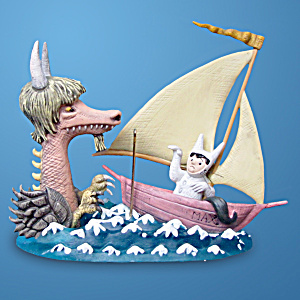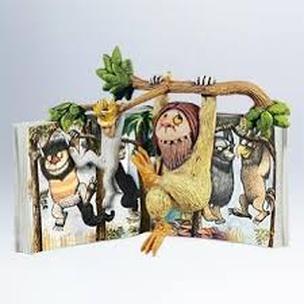|
|
"The night Max wore his wolf suit and made mischief of one kind and another, his mother called him "Wild Thing!" and Max said "I'll eat you up!" so he was sent to bed without eating anything." So begins the beloved classic Where the Wild Things Are, written and illustrated by Maurice Sendak.
This story tells the tale that most mothers already know - the quite normal cycle of rebellion to reconciliation that takes place along the journey to adulthood. Rules are questioned, boundaries are pushed. Max is sure the "Wild Life" - the life without boundaries or rules or self-discipline will be the best possible way to live. That is, until he actually lives it. This same basic story is told in Scripture by Jesus, under the name "The Parable of the Prodigal Son." Like Max, the younger son in the parable gets tired of living a life imposed on him by his family, his society, and whatever or whoever else he feels is getting in his way of truly experiencing life for all it has to offer. We know the story. Like Max, the younger son leaves the family home and "set off for a distant country and there squandered his wealth in wild living." (Luke 15:13) Actually, the Hebrew word originally used instead of "distant country" translates to "the great nothingness." It might just as well be called "where the wild things are." This idea of a special land is important. wild things live without self-discipline. Discilpline does not mean "without" or cmpulsion or forse or punish. It comes from a Greek word meaning "to train." Working on self-discipline requires effort, but it is necessary in order to live a full life. The Land par excellanece, i.e. the Promised Land, is th eland flowing with milk and honey. It is not empty, it is full. It is ordered and harmonious. It is the land of the "great nothingness" or the land of "the wild things" that is unordered. LIke the young son who comes to his senses through the pangso of an empty stomach, Max also Converting or even leaving the land of the wild things requires help. It is a myth to beleive that we can overcome the enormous great monsters on our own. As this story shows, it is through food, maening the Word of God and the sacramental life, that enables us to participate with the grace God sends us and thus move out of the the "great nothingness." But where do we go? Back to the "real world." Max returned to his bedroom. TH eprodigal son returned to the family farm. wild things are given nothing to eat. The Great Amen means I bleieve and will live accordingly. a pledge as well as affirmation. Max grows tired of teh wild life an dthe wild things and imitates his mother "send them to bed without their supper. He realizes he wants to be "where someone loved him best of all>' He makes a move - rejecting the wild things and their life, as soon as he rejects he smells wonderful things to eat, adn sails back over the sea. He finds his supper is waiting for him, a refernce to Eucharist food. |



